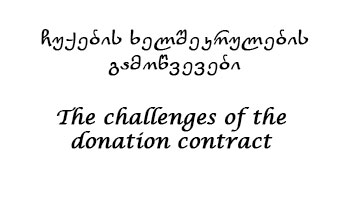As mentioned above, a gift contract is a gratuitous transaction in which the donee transfers property or a right in ownership to the donee after the latter has expressed his consent to accept the transferred property or right. When talking about property, it should be noted that the subject of the gift may be the property that the donor owns at the time of signing the contract, hence the “real nature” of the gift contract. Because the contract is considered concluded after the delivery of the item. As for the gift promise, it in turn raises reasonable doubt regarding the content of the gift agreement. A detailed analysis of the norm revealed reasonable gaps, which do not provide a basis for considering such an agreement as a gift agreement.
When it comes to the promise of gift, the question of practical importance is the extent to which the death of the promisee prior to the delivery of the gift is related to the cancellation of the promise of gift. In this regard, case law is vague, but there is an opinion that, if considered, the positive and real nature of the gift contract may lead to the cancellation of the gift promise. Pursuant to Section 2301 of the German Civil Code, the provisions applicable to testamentary obligations apply to a gift promise made by the promisor on the condition that the donee be alive at the time of the donor’s death. As for the legal consequences related to the death of the donor before the moment of the promised gift transfer, the above mentioned is related to the nature of the promised benefit, which implies the following, if the property is of a material nature and this property is owned by the promisor at the time of the gift promise, the obligation to transfer the promised gift must be transferred to the promisor’s heirs. , and if the obligation to transfer the promised gift is of a personal nature and its performance is directly related to the person of the promisor, then the gift promise loses its validity. An interesting issue is when the promise of gifts was made verbally, although the promisor still gave the promised gift to the giftee, where the party may have a claim to demand the said item by referring to the articles of unjust enrichment. The defect is corrected during the performance of the promised obligation”.





